|
Microchip
to allow wallet-free drinking
By Auslan Cramb, Scottish Correspondent
(Filed:
17/01/2005)
A Scottish nightclub is about to become the first in Britain to offer its customers the
chance to have a microchip implanted in their arm to save them carrying cash.
The "digital wallet", the size of a grain of rice, guarantees entry to the club and allows
customers to buy drinks on account. Brad Stevens, owner of Bar Soba in Glasgow, said his customers had responded enthusiastically
to the idea.
The VeriChip is inserted by a medical professional and then scanned for its unique ID number
as a customer enters the bar.
"There are a number of advantages, from instant access, to not having to carry money or
credit cards, to letting bar staff know a customer's name and favourite drink," said Mr Stevens. "By the time you walk through
the door to the bar, your favourite drink is waiting for you and the bar staff can greet you by name."
However, he said the bar would also have to make sure that customers with the chip had
a limit on how much they could spend to prevent them drinking beyond their ability to pay.
The scheme was criticised by a spokesman for the Scottish Executive, who said the microchip
could encourage excessive drinking, and by Notags, a consumer group set up to resist the spread of radio frequency identification
devices.
A spokesman said: "The chip contains your name and ID number and, as this could be read
remotely without your knowledge, that is already too much information."
New Joint homeland security-canadian border NEXUS Air Pilot Project(Iris Recognition)
Fingerprint recognition a first in biometric field for Microsoft By Kim Peterson Seattle Times technology reporter
 |
|
Home
Back to Menu

|
Get Chipped™
VeriChip™
Pre-Registration Program
VeriChip, the world’s first subdermal personal verification
technology, announces a special, introductory pre-registration program. Sign up today to be among the first in the world to
“Get Chipped.”
We invite you to fill out the pre-registration form below to qualify
for this special introductory offer for the first 100,000 registrants and all qualified ADS Shareholders.
-
$50 Off - All ADSX stockholders of record will receive
a $50 discount at the time of their "chipping" procedure.
-
$50 Off - First 100,000 registrants will receive a
$50 introductory savings at the time of the their "chipping" procedure.
We appreciate your interest in VeriChip. This pre-registration program
is designed to assist VeriChip Corporation in determining where and when to open Authorized VeriChip Centers in the United
States. Pending further regulatory clarification, the Company will make announcements regarding the timing of future chipping
procedures and Authorized VeriChip Centers.
Sign up today.
VeriChip
There when
you need it.
|
Cops Test Handheld Fingerprint Reader

No keys: Public lockers at the newly-reopened Statue of Liberty use fingerprints to identify users.
Biometric tech puts ID at your fingertips. The Statue of Liberty, recently reopened after a two-year closure, stashing a package
offers a glimpse into the future. To rent, close and reopen lockers, visitors touch an electronic reader that scans fingerprints.
'I've got a biometric ID card' By Tom Geoghegan BBC News Online
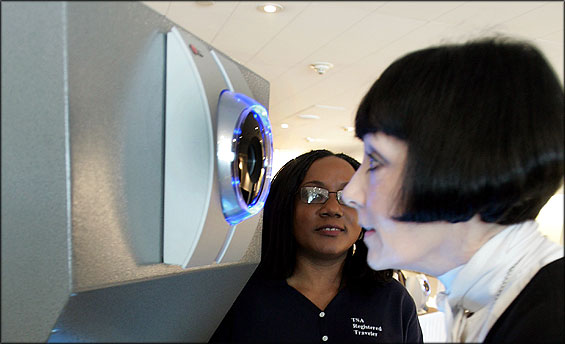
Marybeth Pompei of Cambridge had her iris checked at Logan Airport yesterday as TSA contractor Ola Martins observed. (Globe
Staff Photo / George Rizer) |

Eye scans get frequent fliers' ayes
Plan seen easing Logan screenings
By Keith Reed, Globe Staff | August 10, 2004
Frequent fliers at Logan International Airport began signing up for a trial program yesterday that will use eye scans to
speed their check-ins.
The travelers -- for now only those who regularly fly American Airlines out of Boston -- registered their fingerprints
and other personal information with the Transportation Security Administration before having digital pictures taken of their
eyes. Then, they received a wallet-sized ID with a special computer chip.
Beginning next week, those cards will allow the fliers to bypass long lines leading to security checkpoints by swiping
the card through a machine, which will scan an index fingerprint and an iris -- physical attributes unique in every person
-- instantly checking them against the digital information stored on the chip, and approve travelers to advance to baggage
screening.
Although the government says it may expand the security advancement beyond frequent fliers, for now airports and passengers
hope the system will cut down on lines for everyone and give screeners more time to focus on travelers who could be a greater
security threat.
Despite complaints from civil libertarians who believe the program will allow the government greater access into citizens'
personal lives, those who signed up yesterday morning said they were thrilled.
''In Europe, they do the eye scans anyway," said Mary Holohan, a Hull resident who is originally from Ireland. Holohan,
who ran in to grab an application for the program before rushing to catch a flight to Chicago, said she'd already given the
government most of the information required to become a registered traveler years ago, when she applied to become a naturalized
US citizen.
''Anybody that has a passport, they already have the information about you," she said, referring to such data as date and
place of birth, address and physical description.
Yesterday's registrants, chosen because the airline volunteered its best customers, found the 10-minute process easy, despite
a few glitches.
Passengers had to sit with their eyes about six to eight inches away from a special camera that snaps separate pictures
of each iris. But when David Frogel of Westborough sat in front of the machine, ''for some reason, it thought my left eye
was my right eye," he said while sitting on a bench waiting for a security administration manager to correct the problem.
Thomas DeWinter, manager of business development for LG Electronics USA, the Jamesburg, N.J., company that makes the iris
cameras, said about one in eight people have a problem when they first sit in front of the machines because most people look
into the camera with both eyes instead of one.
The system allows passengers to wear glasses or even colored contact lenses when scanning their eyes. But anyone wearing
contacts with unique patterns on them, which have become fashionable among teens in recent years, would have a problem.
''Color doesn't matter, but if you have a patterned lens, we would make you remove it before you register," said Kevin
Clarke, a spokesman for EDS Corp., of Herndon, Va. EDS is administering the trial program in Boston and at
Ronald Reagan Washington National Airport in Washington, D.C. under a $1.3 million contract with administration.
Another company has been running a similar pilot program at three other major US airports since June, exceeding enrollment
goals.
Travelers at Logan yesterday had to bring their invitations from American, along with two government-issued
forms of identification -- such as a driver's license and passport -- and fill out a detailed enrollment form.
Marybeth Pompei of Cambridge was among the first to complete the application and test the process. She approached a kiosk
and swiped her card. The kiosk, about the size of an arcade game, has a large screen to display text, a small digital pad
for scanning fingerprints and a camera at the top used to match the iris photo.
Finding a match, the screen displayed a huge digital picture of Pompei's iris.
''I'm looking at a big picture of my own eye," said Pompei, whose job as senior vice president at Exergen Corp., a medical
devices company, takes her on travel at least three times weekly. ''This means one less thing I have to go through."
When the system is fully deployed next week, she will be able to flash her card and move directly to a dedicated baggage-screening
lane for registered travelers where there would rarely be a crowd.
She won't have to show her boarding pass there and will avoid the random ''special screenings" that include manually searched
luggage and shoe removal.
Los Angeles International Airport, Minneapolis-St. Paul International Airport and George Bush Intercontinental Airport
in Houston have already begun trials, while Ronald Reagan National will start next week. The security administration, which
is spending about $5 million on the 90-day trials, sought busy airports spread throughout different regions of the nation
to determine whether the equipment is effective and reduces lines.
Officials said yesterday they hope to get 2,000 passengers per test city registered during the trial period. When testing
ends, the agency will review the data, with an eye toward expanding the program.
In Boston, the program is limited to American Airlines' most frequent fliers who use Logan as their primary departure airport.
In Minneapolis, the test is limited to Northwest Airlines frequent fliers. United Airlines passengers can sign up in Los Angeles and Continental Airlines passengers are eligible in Houston.
The trial is limited to only the most frequent fliers so the security administration would be able to easily evaluate how
much it expedited travelers' waits, said Ann Davis, the agency's northeast regional spokeswoman. American informed about 8,000
of its Boston passengers who fly at least once per week they could sign up for their registered traveler cards at Logan this
week. About 120 had signed up by noon yesterday, Davis said. Registration ends Friday.
Because the program is still being tested, passengers will only be able to use their registered traveler cards at their
home airports.
A Boston registered traveler could bypass the security line with her card at Logan, but if returning home from Houston,
for example, she would face regular security procedures.
So far, the program has been popular in Minneapolis, which opened its dedicated registered traveler lane July 7. About
2,400 passengers there registered and as many as 300 passengers have used it in one day.
''They've checked both the iris technology and the fingerprint technology," said security agency spokeswoman Amy von Walter,
''and it's gone very well."
Keith Reed can be reached at reed@globe.com.  |
The Surveillance-Industrial Complex The Privatization of Surveillance The U.S. security establishment is rapidly increasing
its ability to monitor average Americans by hiring or compelling private-sector corporations to provide billions of customer
records. The explosive growth in surveillance by government and business is creating a "Surveillance Industrial Complex" that
threatens all of our privacy.
Tracker Chips in Canadian "E-Passports"
Sickening ABC News Piece Lauds Implantable Microchips
Chip Implanted in Mexico Judicial Workers
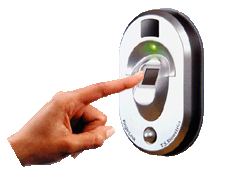
| iS THIS HOW YOU WANT TO GET IN YOUR HOME |
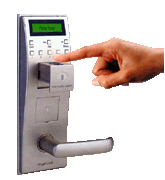
|


Baja Beach Club in Barcelona, Spain Launches R.F.I.D Microchip Implantation for VIP Members
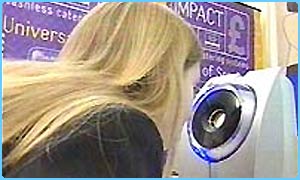
U.S to implement biometric passport.
WILL YOU SUBMIT TO THE CASHLESS SOCIETY CONTROL GRID?
cbc canada on biomatrics
Our clients speak
volumes
Everybody's more relaxed. Young lunch packers would often
fret about losing lunch money on the way to the cafeteria. Now they just swipe their finger and charge their account. A substitute
teacher would throw the old laborious system into chaos. Now I spend more time teaching."
Jackie Meyers, Kindergarten
Teacher
"Both students and teachers no longer have to worry about the lunch process or managing money. The ones
who forgot their lunchbox on the bus just get in line and debit another lunch. Those low income kids who used to plop down
only 40 cents in front of peers with $1.25 aren't singled out. And the fickle eaters who order a PB&J in the morning,
only to realize at noon that ravioli was the way to go, aren't bound by the decision. The new scanning system allows the student
to decide what they'll eat as they enter the line."
USATODAY.COM, February 2, 2001
"Since we put the 'solution' in 3 years
ago here at Penn Cambria our participation has increased by 12%, our revenue is up $94.00 per student annually, our breakfast
program doubled and we increased our Free and Reduced percentage by 3.5%.
We aren't piled up in paper and spend less
than an hour a day on reporting for both the business office and state/federal requirements. We have time to plan and poll
the students three times a year to make sure we are serving what they want. Our cooks get together to plan new menus and refine
the existing one. The 6 site managers now work as a team. It's been a nice transition to watch.
They standardized every recipe. Both the kids
and staff say the quality and the choices have never been better. That's part of the reason for the revenue increases. The
other is giving the kids a debit account.
As the parents now send us checks for a week, month or whatever
they choose, we don't have to deal with lost or stolen lunch money and the parent knows that the money he gives his children
really does get used for lunch. There is even an educational aspect of the program.
Since the student can charge both meals and
al a carte, (with parental permission), they learn how to manage a bank account. Sure a parent has a conniption when Josh
goes a little overboard the first month, but I print them a detailed statement of every day, every item. After that, Josh
has to work it out with mom and dad with regards to what he is eating and how much he is allowed to spend each day.
If it persists to be a problem we just turn
his al a carte account off. As for meals, I never turn a kid down for a meal. We'll get the money somehow. My bad debt last
year was less than $400 for 2000 students.
There's no lost lunch money, the teachers have
no responsibility for any cafeteria function, (they absolutely love it), and the administration is ecstatic with the results.
What Food Service Solutions has is a whole
lot more than point of sale or software. They have a 'solution' or find one for almost any need I have when it comes to
processing or interpreting information.
The state auditor showed up in August for our
new summer feeding program. He planned the afternoon and was done in less than a half hour. Said he didn't know how I pulled
all the information together but that every school ought to have this type of reporting capability.
We are the first school district in the country
to implement the biometric fingerscan for school lunch and after working out all the kinks it is quick, reliable
and well accepted by everyone in the district. The elementary kids love it and the bigger kids know they can't beat it.
They can't put in someone elses PIN number, swap or give their card to someone else.....best of all they can't forget or lose
them.
We get eight to ten kids through the line
a minute with no cash and six to eight when the student is fumbling around looking for his money. We discourage cash in
the line, but just like the fingerscan, it isn't mandated".
Milton Miller, Food Service Director
Penn Cambria School District
814-886-7753
or mamiller@pcam.org
"The system is so simple, it's almost child's play. The elimination
of lunch tickets helps protect the privacy of students participating in Free and Reduced lunch programs."
FOX News
"I know for a fact that when I send in my check the money
is being used for school lunch. It sure beats trying to find $1.60 every day for each of my three children".
Parent
"Easy as pie. I wait until all other kids are done. I put
my finger down on it--use the pointy finger--and in just a little while, the red light shut off. My money comes from my bank
account."
Austin"Zeke" Adams, Student age 7
"The fingerscan follows the national privacy acts. Unless
the finger is there, it can't tell you who it is. Once the students realized that the police can't come in and say 'Hey, I
found this fingerprint on the Burger King robbery, can I match it in your database?' the students were OK with it".
Bob
Engen, President
Education Biometrics Technology
Caledonia, MN
"It's certainly a lot faster and the most
of the kids keep accounts so they can eat what they want when they want. Only a few of the 700 students have opted to use
a PIN number instead of the fingerscan".
Linda Kelly, Cafeteria Manager
Welsh Valley School, Philadelphia, PA
"The kids
move through the line faster and really like the high tech biometric technology. Not even the cashiers know who is free
and reduced and the kids sense this. We have utilized the extra reimbursement to improve our food quality, which helped
increase participation and we are feeding more kids. The system is a total success".
Dr.
Russell Strange, Superintendent
Penn Cambria Area High School
"As a teacher I love the new cafeteria solution. We used to
spend 20-30 minutes collecting lunch money, handling the cash and giving change.. That amounts to an extra 60 hours of
learning time for the kids annually."
Sue Creighan, First Grade Teacher
"You don't have to bring
lunch money. So, somebody can't take it"
Student-age 13, Welsh Valley Middle School, Philadelphia, PA
"I
like the fact that when I have a question, problem or concern that Food Service Solutions has real people answering the phone-no
voice mail-and they really do understand that getting an answer to the issue at hand is a priority. A-plus for service."
Dawn
Wheeler, Food Service Director
Garfield Heights School District
Garfield Heights, OH
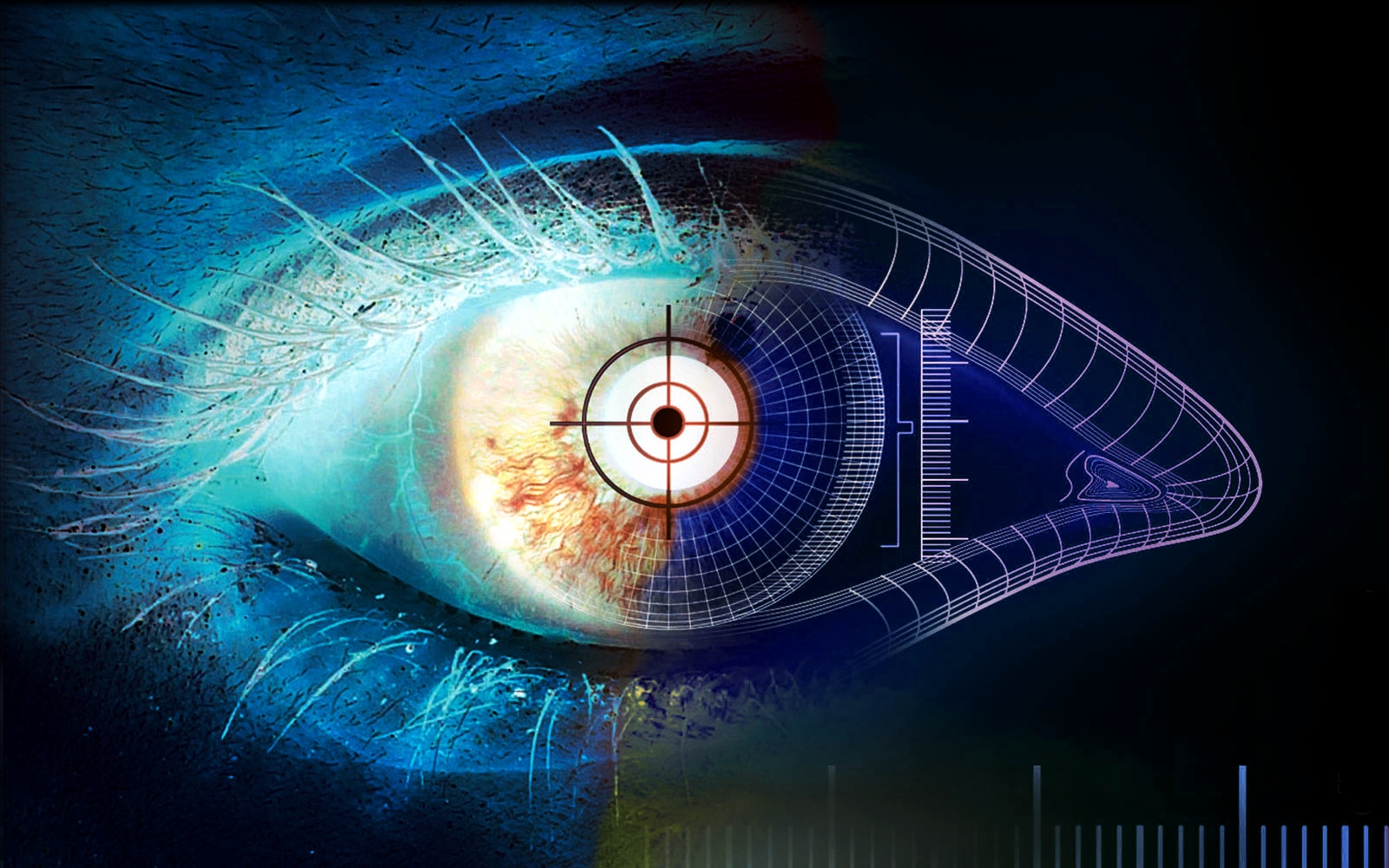

|
![]()












